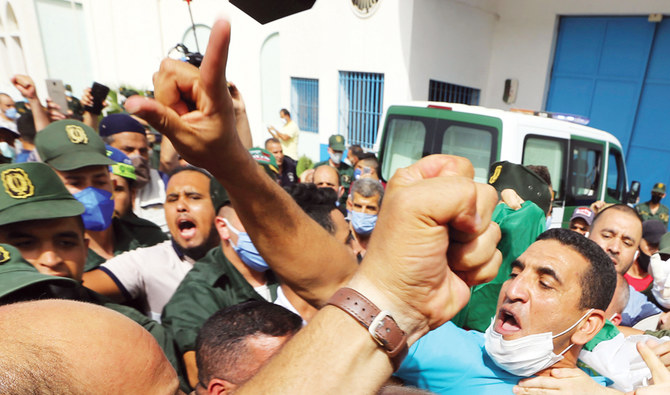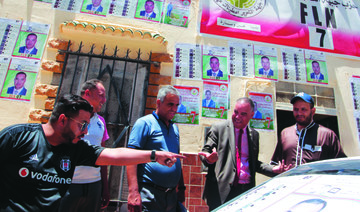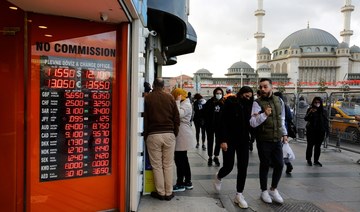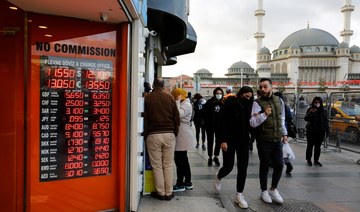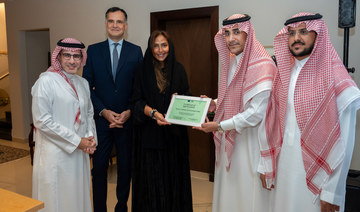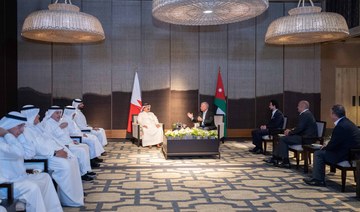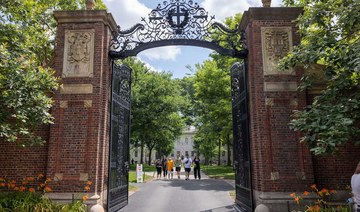ALGIERS: A politician and a journalist who are prominent opposition figures in Algeria have been arrested days ahead of the country’s parliamentary election, according to a group of lawyers defending jailed activists of the pro-democracy movement.
The Algerian League for the Defense of Human Rights said seven leading protest movement figures had been arrested on Thursday evening, five in Algiers and two in other parts of the country. “We do not know the grounds for these arrests,” its vice president, Said Salhi, said.
Among those detained in Algiers were leading opposition figure Karim Tabbou and independent journalist Khaled Drareni, as well the director of a pro-reform radio station, Ihsane El-Kadi.
Drareni was being held in a barracks on the outskirts of the capital. His only contact with his family was a 1:30 a.m. phone call, his lawyer Zoubida Assoul said.
The journalist, who was only released on bail in February after being detained while covering a mass demonstration in the capital in March last year was expected to face a new trial.
Tabbou and Ihsane El-Kadi were being held in the same barracks, their lawyers said.
Algerian Communication Minister Ammar Belhimer accused El-Kadi of “divulgating information likely to be detrimental to the national unity.”
El-Kadi was placed under judicial supervision on May 18 with orders to present himself at a police station once a week. His passport was confiscated.
Since last month, the government has clamped down on the weekly protests of the Hirak reform movement, detaining hundreds of activists who have defied new restrictions on public gatherings.
FASTFACT
On Saturday, Algeria is set to hold its first legislative election since former President Abdelaziz Bouteflika was forced from office in 2019 after 20 years in power.
Prior approval is now required from the Interior Ministry, an impossible demand for a movement that prides itself on having no formal leadership, making all of its demonstrations effectively illegal.
A presidential decree published in the official gazette on Thursday opens a new avenue for the prosecution of Hirak activists by changing the penal code’s definition of acts of terrorism.
It establishes an official blacklist of individuals and entities suspected of terrorism that could be used against activists, opposition leaders or journalists.
Police were out in force in Algiers to preempt any attempt by the Hirak to protest.
“This repressive atmosphere and the restrictions placed on human rights and freedoms mean these elections have no democratic value,” Salhi said.
Hirak supporters have vowed to boycott the election, which President Abdelmadjid Tebboune called as part of his pledge to tackle corruption and build a “new Algeria,” as they denounce a crackdown on opposition and increased repression of protests.
Police sealed off the Algerian capital on Friday to prevent protesters gathering on the eve of the election.
Algeria’s president and the generals backing him hope Saturday’s parliamentary election will mark an end to two years of upheaval, but in the capital’s steep, winding streets few people seemed enthused.
While thousands of candidates rallied supporters at official campaign events for an election that moderate Islamist parties aim to win, the low turnout in recent national votes has underscored public skepticism for the process.
“I won’t vote because nothing will change. Nothing at all,” said Khadidja, a woman in a facemask and pink headscarf speaking near a wall plastered with election posters.
The establishment believes replacing the old president, parliament and constitution, coupled with the jailing of numerous Bouteflika cronies, is the best way to end the biggest crisis in decades, said a former senior official.
“The election is another effort to gain some popular legitimacy with the aim of building a new political map,” said Abdelhak Bensadi, a political science professor at Algiers university.
Supporters of the leaderless “Hirak” protest movement point to an increasing security crackdown on dissent and dismiss Saturday’s election as a charade. They want a more thorough purge of the ruling elite and the army to quit politics.



